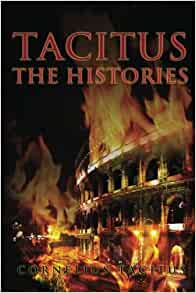Janne Floris compares two versions of Tacitus' Histories:
"'...the chronicle as such, the narrative line, does not split until the fifth book, very soon after the scene where the copy that survived breaks off. Is this coincidence?'
"'I dunno,' Everard replied. 'and better we pass that question by. Kind of spooky, huh?'" (p. 487)
They never do return to that point. History split just after the point where the surviving Histories had broken off. Poul Anderson fills his Time Patrol series with hints of something just out of sight or out of reach. Guion tells Wanda Tamberly:
"'There are occasions when we know only that the web is troubled, not where or when the source of the disturbance lies; for that source perhaps does not exist in our yet, our reality. We can only trace it back up the threads -' He broke off. 'Enough. I do not mean to frighten you.'
"'I don't scare easy, sir.' This could do it, though."
-Poul Anderson, The Shield Of Time (New York, 1991), PART THREE, 31,275,389 B. C., 135.
Our yet: a hint of Temporal phraseology. Up the threads, they will find either a time traveller who has arrived from neither past nor future of the current timeline or an event that contradicts history as they know it.

1 comment:
Kaor, Paul!
I remember Guion! And he seemed to have been troubled by the Danellians. Enough so that Everard wondered if they FRIGHTENED him. Belonging as he did to the Middle Hierarchy of the Time Patrol and coming from a future era much nearer the Danellians, Guion apparently knew more about them than did Everard. Were the Danellians no longer even human?
I will have to check my Penguin Books edition of Tacitus' HISTORIES to see where the narrative broke off and what was being discussed there.
Ad astra! Sean
Post a Comment